

The Unfolding Journey '24
LAND Capstone Studio
Guided by- Professor Barry Kew
Ayesha Syed
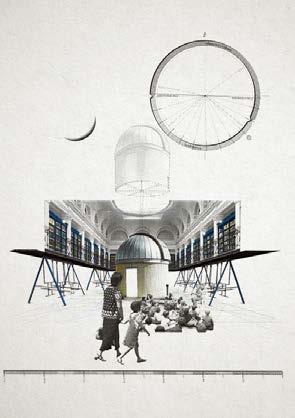
INTENT

Memorial is a time capsule. Showing the past to inform and reflect on the incident. Sculpture and architecture aid in portraying that idea. Healing space to get out of trauma and provide peace. Keeping the planting palette natives suggest the roots of Cincinnati’s Westend community and is diverse acknowledging the seasonality change. Using sensory experiences like visual, smell, touch, and audio to create a serene environment. Using flowing and dripping water to create a white noise effect. Different plants and materials can also be used to achieve the touch aspect of the sensory play. I imagine a gentle breeze through leaves, wind chimes, or the sound of wind whistling through a canyon can be soothing. These would help in making a contemplative environment.
HISTORY

Unveiling historical incidents that happened in the last 50 years, some research studies have perpetrated egregious atrocities against vulnerable populations. the Cincinnati Radiation Experiments, conducted from 1960 to 1972, exposed around 120 individuals, predominantly African American and socio-economically disadvantaged, to lethal doses of radiation without informed consent.
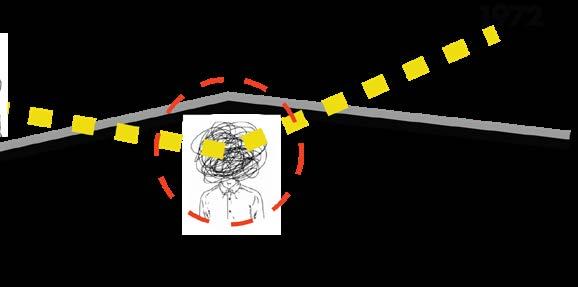
These experiments continued despite high mortality rates and only came to light due to the efforts of investigative journalists and public outcry. The aftermath of these tragedies led to the establishment of laws and regulations governing research ethics, including requirements for informed consent and institutional review boards to safeguard the rights and well-being of research participants. Despite legal actions and memorials, the victims of these experiments can never be fully compensated for the injustices they suffered. However, understanding these historical events serves as a stark reminder of the importance of ethical conduct.
ARTISTIC INSPIRATION
This quilt building pattern process has been an opportunity to learn more about the unfortunate radiation experiments happened at University of Cincinnati Hospital. Similarly, the pattern is exploring the aspects of aftermath of these radiation experiments on the cancer patients. The stages they went through after the radiation experiment are explored in the pattern. For that, there have been few art and symbology from which I have drawn inspiration for my pattern. Also choosing key information like numbers and colors to express the story through the pattern.
INSPIRATION

Symbolic Expression
Radiating

Repetitive
Disturbance

Splash of Paint
The different expressions of the word radiate in symbology. The splash of paint is asymmetrical yet it feels like it has center.

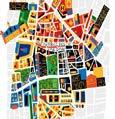
Modular Grid
Horizontal and vertical lines, forming squares. Divide into sections to aid in composition.
Urban design concept where the city is planned and constructed using modular components.


Overlapping Iridescent Haze
An iridescent haze that overlaps refers to a captivating visual effect where layers of translucent or reflective surfaces produce a play of shifting colors.


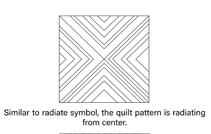
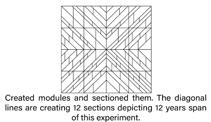


QUILTING PROCESS
1
Frame Building

2
3
Measuring the required length for constructing a frame.
Fabric Selection and cuting
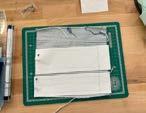
Tracing three standard sizes of diagonal columns and cutting them according.

Cutting standard size for all the respective colors in the four distinct module.
Layering and Binding process

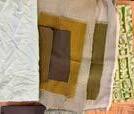
Using rotary cutter and straight ruler to cut the fabric in a straight line.
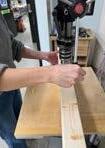

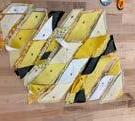




 Cutting the lumber into sheets. Punching holes for bolts.
Hand stitched the smaller diagonal sections
Cutting the lumber into sheets. Punching holes for bolts.
Hand stitched the smaller diagonal sections
RESEARCH

Questions formulated:
• How can the design capture the essence of the loss or event?
• How can the design integrate historical artifacts or stories in a way that is both respectful and engaging for future generations?
• How would a plant palette help in achieving this goal?
• What symbolic elements or features can be incorporated into the design to convey the memorial’s message?
• What recreational and educational opportunities can the park offer to visitors?
“HOW
ARE MEMORIAL PARKS CRAFTED TO PORTRAY A SOMBER HISTORY WHILE ALSO SHOWCASING A HOPEFUL FUTURE THROUGH THEIR LANDSCAPE DESIGN?”
2 1
Honoring the Somber Past


Materials and Colors: Using natural materials like weathered stone, granite, or dark slate for memorials can evoke a sense of permanence and gravity.
Reflective Water Features: Still ponds or waterfalls can provide a space for quiet contemplation and reflection on the lives lost. The sound of water can be calming and symbolic of the passage of time.
Evoking a Hopeful Future

Open Lawns and Meadows : Large open spaces with vibrant green lawns or wildflower meadows can create a sense of peace and renewal. These areas encourage visitors to spend time in nature and find solace.
Sculptures and Art Installations: Uplifting sculptures or artwork depicting themes like hope, peace, or rebirth can offer inspiration and optimism.
Bridging the divide



Paths and Walkways: Winding paths that meander through the park can connect different sections dedicated to different moods or purposes. This allows visitors to transition between reflection and hope at their own pace.
Benches and Seating Areas: Providing comfortable seating areas in both somber and uplifting sections allows visitors to reflect, connect swith each other, and find solace.
Seasonal Flowers : Incorporating flowering plants that bloom throughout the year adds pops of color and signifies the cyclical nature of life and rebirth.



PRECEDENT
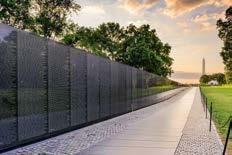
The Vietnam Veterans Memorial, also known as the Wall, is a national memorial in Washington D.C. that honors the service members of the U.S. armed forces who served in the Vietnam War. The memorial is made up of two black granite walls engraved with the names of more than 58,000 Americans who died or remain missing in the war.
The design initially faced criticism for its starkness and lack of traditional war memorial elements. However, Lin’s intention for personal reflection and honest portrayal of the war’s human cost ultimately resonated with veterans and the public, making the Vietnam Veterans Memorial a powerful and enduring symbol of reflection, remembrance and healing. The Vietnam Veterans Memorial is a powerful and moVietnam
1 The
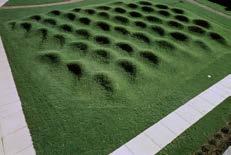
2
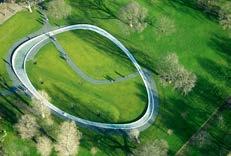
Princess of Wales Memorial Fountain, 2004
London, United Kingdom
Another Maya Lin’s work, which shows the sculpture dancing like a water wave, inspired by the science of flow. It bridges the gap between the artist’s love for landscapes and the fascinating world of aerospace engineering. This artwork, gracing the University of Michigan, takes the form of a recurring natural water wave, cleverly connecting it to the theme of flight while also reflecting its location. Visitors can immerse themselves in the endless flow of water and fluidity, experiencing the sculpture from both the classrooms above and the surrounding garden.
Embodying Princess Diana’s warmth and inclusivity, the fountain unfolds like welcoming arms across Hyde Park’s slope. Its energy draws people in, inviting them to connect with the water’s playful spirit. Grooves and jets dance with the water, creating playful effects like the cascading “Chadar” and the swirling “Rock and Roll.” A gentle pool awaits at the bottom, offering a moment of reflection.This masterpiece isn’t just about aesthetics. Groundbreaking technology crafted 545 pieces of Cornish granite into a light-colored ring, contrasting beautifully with the surrounding greenery. Water bubbles up from the
SITE ANALYSIS
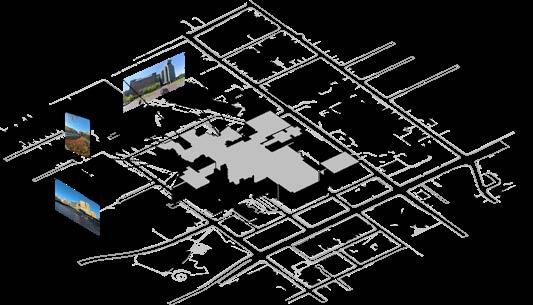
The site location matters as it draws the connection between the past and now being used as a blank canvas to paint and narrate the story. It can imbue the design with symbolic meaning, forge emotional connections, and determine its accessibility to the public. The site shapes how visitors interact with the memorial, fostering reflection and remembrance.
Beyond emotional resonance, the location dictates design choices and considerations for sustainability. The ideal site thoughtfully balances these various aspects, ensuring the memorial not only honors its subject but seamlessly integrates with the community, leaving an enduring legacy for generations to come.
In our site context, the UC medical campus is the prime location as that’s where the incident happened. The medical staff, intimately connected to the healthcare narrative of the site,
would find a space for reflection and empathy. Beyond these immediate stakeholders, the surrounding community, which engages with the area for various purposes, also becomes an integral part of the memorial’s audience. By considering the broader community, the memorial not only becomes a place of remembrance but also a symbol of collective healing and shared history. In all, the site grounds the memorial in its historical context and ensures that its impact resonates with those directly involved as well as the wider community that converges in this dynamic space.
In the future, I would like to know how this site design expands and flows from the UC East campus to the Main campus. The relationship between these campuses is key for informing and drawing more people’s attention to the memorial designed on the other campus.
University of Cincinnati Medical Campus Cincinnati
Connection Diagram
Sun Study Diagram
Wind Study Diagram
MASTER PLAN

Phase 1: Sigma Sigma Commons, University of Cincinnati
The master plan for UC’s West campus prioritizes establishing a seamless connection between campus users and the memorial site, emphasizing both physical pathways and visual cues to guide individuals toward this important destination. By creating a clear visual hierarchy leading to the site, the design ensures that the memorial is easily identifiable and accessible within the surrounding landscape.
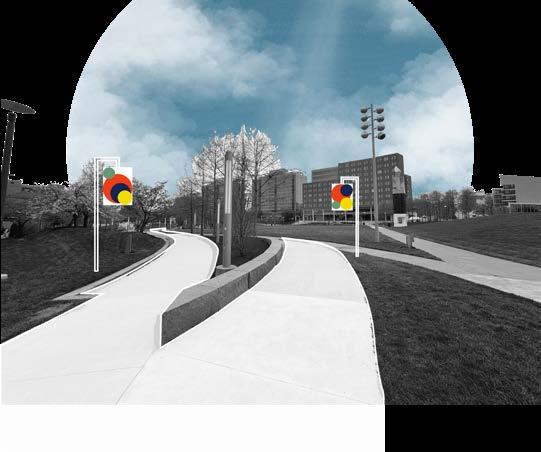

Phase 2: University of Cincinnati, East Campus
However, rather than confining the memorial to a distinct area, the plan seeks to integrate it harmoniously into the urban environment, incorporating elements of its design and significance into nearby structures and public spaces. This approach not only honors the memorial’s importance but also fosters a sense of continuity and reverence throughout the campus, enriching the overall experience for visitors and enhancing the site’s cultural significance within the community eventually uniting in a tranquil basin.

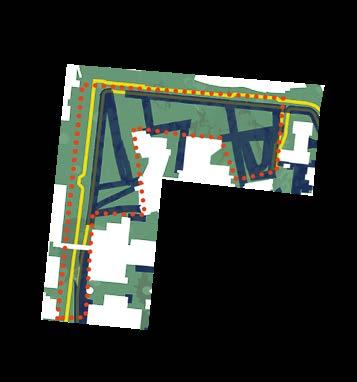

SITE DESIGN
HEALING REFLECTION
AWARENESS
Getting design inspiration from the quilt, an artwork, that speaks its own language in portraying emotions like empathy, disturbance, and modularity, it would be amusing if it translated into site design. A memorial, in essence, serves as a profound time capsule, encapsulating the past and unveiling its stories to inform and evoke reflection on significant incidents. The synergy between sculpture and architecture plays a pivotal role in translating this concept into a tangible experience. Beyond mere physical structures, a memorial transforms into a healing space, a sanctuary crafted to guide individuals through the journey of trauma toward a place of inner peace.
By embracing the sensory spectrum – visual aesthetics, aromatic scents, tactile elements, and ambient sounds – the memorial strives to craft a serene environment that engages visitors on multiple levels. The inclusion of flowing and dripping water, creating a gentle white noise effect, further enhances the auditory experience, fostering tranquility. Diverse plants and materials cater to the tactile aspect of sensory engagement, inviting individuals to interact with their surroundings. Envisioning a gentle breeze rustling through leaves, the melodic chime of wind instruments, or the whisper of wind akin to a canyon’s echo, the memorial aspires to cultivate a contemplative atmosphere, inviting introspection and solace in the embrace of nature’s elements.
ENVIRONMENTAL SOCIAL AND CULTURAL EDUCATION
ZONE 1
ZONE 2
ZONE 3
ZONE 4
PROCESS DIAGRAMS
ELEMENTS



LANDFORMS SHADOW PLAY
CONNECTIONS AND CIRCULATIONS
WATER PLAY
VEGETATION
PEOPLE AND ACTIVITY
The design utilizes the natural terrain by incorporating raised and lowered terrace beds, resulting in a tiered landscape effect. Varied heights of walls are strategically placed to manipulate sunlight and cast intriguing shadows. While a central pathway guides visitors through distinct zones, there are opportunities for exploration and interaction with the landscape elements. Water features are interconnected through a channel, producing a calming white noise as water cascades. Carefully selected plants provide shade and contribute to a healing environment, particularly for individuals who have undergone trauma. The memorial site offers a space for socializing and introspection, encouraging visitors to engage with both each other and their surroundings.
SITE PLAN
ZONE 1: MEANDERING ZONE
ZONE 2: WALLED FOREST
ZONE 3: PLAZA
ZONE 4: HEALING QUAD
LEGEND ENTERANCE
TERRACE LEVEL 1
TERRACE LEVEL 2
TERRACE LEVEL 3
STAIRS RAMPS
GABION WALLS
SCULPTURAL COLUMN
WATER BEDS
WATER CHANNELS
STRATEGIES
ZONE 1: MEANDERING ZONE
ZONE 2: WALLED FOREST
Cultural exploration
Understanding death and grief
ZONE 3: PLAZA
Space for ar t and architecture
Strengthens social bonds
ZONE 4: HEALING QUAD
Improved air qualit y Habitat creation
Memorial parks can create a sense of community for those who have lost loved ones. Having a designated space to visit and reflect can be comforting for those who are grieving.
Memorial parks can be open to the public and serve as a place for quiet reflection or even educational purposes. Visitors may learn about local history, significant figures, or simply contemplate mortality and life in a peaceful setting.
Memorial parks incorporate public art installations or unique architecture into their design. This can enrich the cultural landscape of a community and provide a beautiful backdrop for remembrance.
Trees and plants in memorial parks absorb carbon dioxide and release oxygen, contributing to cleaner air.
Memorial parks designed to accommodate diverse cultural practices around death and remembrance can provide a window into different cultures and traditions. This can foster tolerance, understanding, and respect for a variety of beliefs.
Memorial parks can be a gathering place for families and communities during times of grief. Sharing memories and offering support in a designated space can strengthen social bonds during difficult times.
SECTIONS






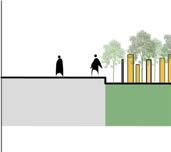

SOCIAL&CULTUREEDUCATION EDUCATION
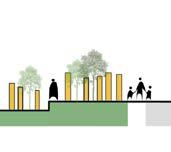

SOCIAL&CULTURE
SOCIAL
RENDERED VIEWS

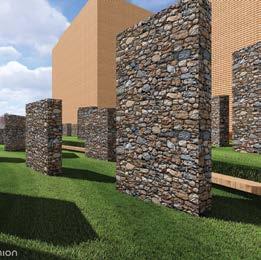
Walled forest

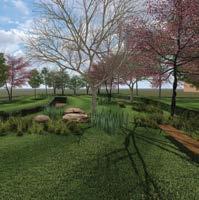

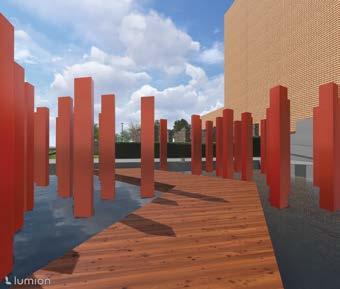

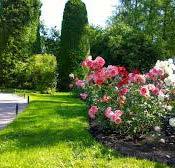

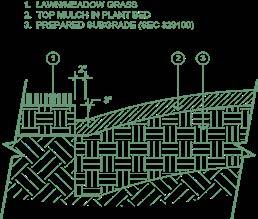

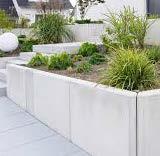
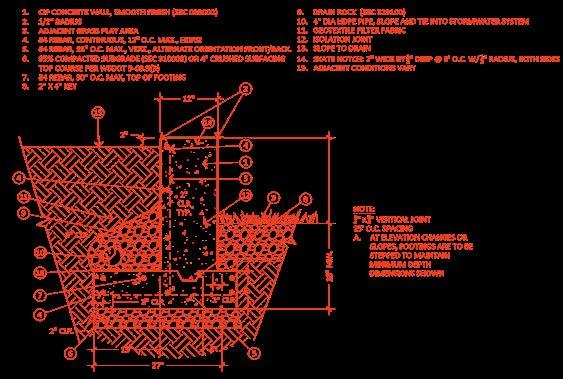
CONCRETE RETAINING WALL+ SEATING
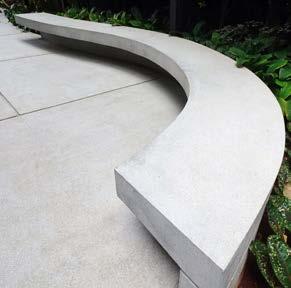

PLANT PALETTE
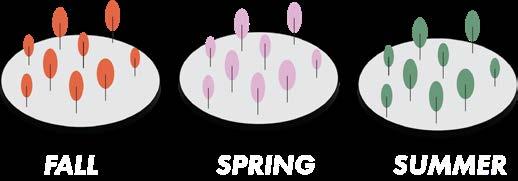

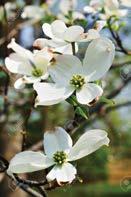



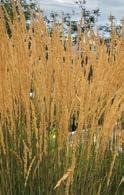


MODEL

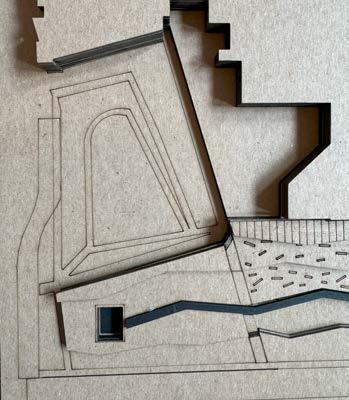


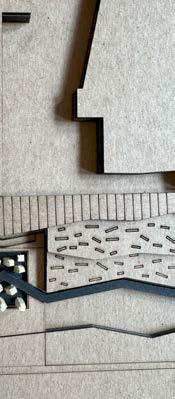
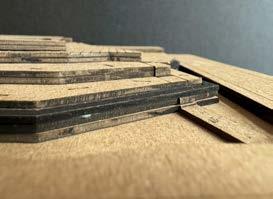

REFRENCES
1. https://www.surfacemag.com/articles/maya-linvietnam-veterans-memorial/
2. https://www.mayalinstudio.com/memory-works/ vietnam-veterans-memorial
3. https://www.mayalinstudio.com/art/the-wave-field
4. https://www.archdaily.com/803509/diana-princessof-wales-memorial-fountain-gustafson-porter-plusbowman
5. https://www.gp-b.com/diana-princess-of-walesmemorial
